Change three words you use each day
and transform your life for the better
During these extraordinary times, it’s easy to feel pressured (by others or ourselves) to do more of those things that we think we ‘should’ be doing.
But that way of thinking doesn’t really help us to ‘achieve more’ at the best of times and it certainly won’t help now.
So, let’s explore a different (and kinder) way to talk (to ourselves and to others) that could help us now and when things get back to ‘normal’… whatever that might look like in the future.
If you’re a parent or coach, these ideas could help you to help those you care about too.
These are not quick-fix ideas
You’ll only need 5 to 10 minutes to read this Insight and, by having these proven and powerful ideas distilled into three simple words, you should find them easy to remember 🙂
That said, these ideas won’t deliver results for you unless you follow up with actions. The idea that ‘Ideas are enough’ is a classic trap and we’ll talk more about that in a moment.
Solid life changes require solid guidance
According to Bill Gates (founder of Microsoft)
Everyone needs a coach. It doesn’t matter whether we’re a basketball player, a tennis player, a gymnast or a bridge player.
We all need people who will give us feedback. That’s how we improve.
Whilst Eric Schmidt, CEO of Google said:
Every famous performer has a coach. Somebody who can watch what they’re doing and say, ‘Is that what you really meant?’
A coach gives you perspective – and that’s the one thing none of us are good at – seeing ourselves as others see us. So a coach really helps.
Of course, it’s easy for those guys to say, ‘get a great coach’ – not everyone can afford one of those.
The good news about today’s world is that you can read up (or watch videos) on the ideas you need (to deal with the challenges you face) from world-leading experts… provided that you know who those experts are.
There’s the first challenge because, on questions of personal performance, you’ve probably not heard who the best people are.
They’re certainly not the superstar (or self-acclaimed) gurus who give motivational talks at big-ticket prices from a stage.
No, the real experts are (as on most subjects) the quieter Academics, Psychiatrists and Coaches whose ideas on personal performance are backed by solid science.
World-leading thinkers to follow…
Obviously you want to follow people with expertise in the particular challenge you face – and if you’re interested in personal performance or personal finance you might find this selection of my favourite books helpful
That said, you could save yourself a lot of reading time by just following along here – and allow me to convert all that stuff into plain English 🙂
For now, let’s focus on some solid, science-backed ideas around ‘Mindset’ and Personal Performance, by drawing on the work of these four people who are all well-proven in their field:
- Steve Peters
- Carol Dweck
- Susan David
- David Burns
Here are some brief introductions to each of them:
Dr Steve Peters
Steve Peters is a psychiatrist and author of Chimp Paradox – and mind coach to the multi-gold medal-winning British Olympic Cycling team.
Professor Carol Dweck
Carol Dweck is a professor of Psychology at Stanford University and author of ‘Mindset: How you can fulfil your potential’
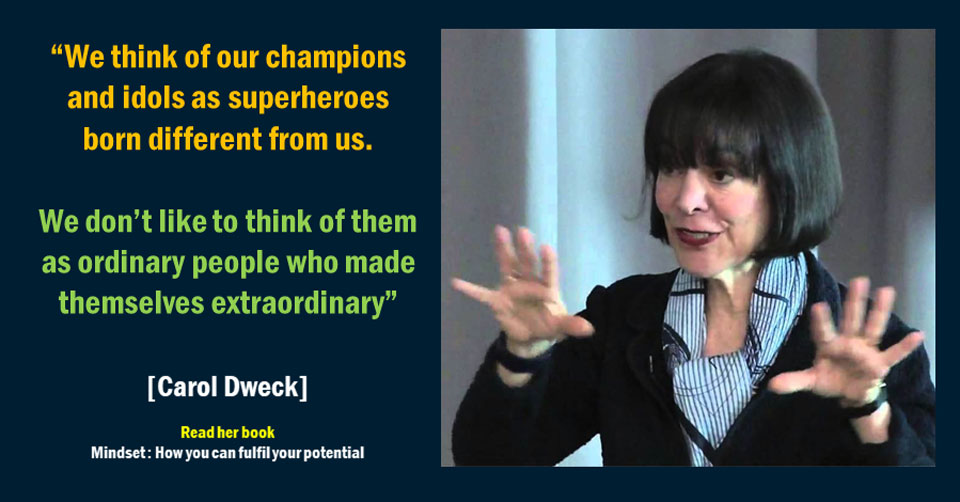 Dr Susan David
Dr Susan David
Susan David is a Psychologist at Harvard Medical School and author of “Emotional Agility”
 Dr David Burns
Dr David Burns
David Burns is a Psychiatrist and author of the bestselling book ‘Feeling Good: The New Mood Therapy’ (acclaimed by health professionals, the world over, for helping many thousands of people (including me) to deal with depression) 
So, you’re on solid ground here because we’re standing on the shoulders of these giants.
Now, let’s crack on and explore what might have sounded like an absurd idea… about changing our life by changing just three words we use.
The first keyword – to change for success
Just for fun, I’ll borrow a gag used by Mel Robbins in this talk to reveal our first problem word.
This word has four letters and begins with the letter F.
Can you guess what it is?
Oh, go on, have a guess…
No, it’s not that word! 😉
The word I’m thinking about is ‘fine’ – and fine is a problem word because it tells us there’s no gap (positive or negative) between where we are now and where we want to be.
The truth is that we all have gaps in one or more area of our lives, whether it’s in:
- The mastery of our health
- The quality of our relationships
- The satisfaction we get from our work or
- Having enough money to do the things we want – for ourselves or our loved ones.
Whatever gap (or gaps) we have, we won’t do much, if anything, about them if we deny they exist, right?
So, why do we say we’re ‘fine’ – so often?
Well, we might tell others that we’re fine, when we’re not, because we don’t want to burden them with our troubles, right?
And, depending on who we’re talking to, that’s perfectly understandable. I’d just encourage you not to hide your challenges from the person you rely upon for support – or from your coach if you have one – that’s just a waste of your money and time.
The more interesting question is why we tell ourselves – in our internal dialogue – that everything’s fine in our lives – when it’s not?
I’d guess that we all some have (evolutionarily developed) self-protection mechanism which can help us to cope with seriously difficult situations in our lives – by enabling us to accept things as they are.
However, there are other less natural and unhealthy reasons why we might deny our (so-called) negative emotions.
Today’s leading Psychologists believe that for years we’ve been misled into believing that we can benefit from denying certain emotions. And these ideas on positive thinking and happiness (widely promoted in the 1990s) were thought, by many, to offer a new age blueprint for parenting.
Sadly, as you can see in the first 5 minutes of this interview with Dr Carol Dweck, those ideas were found to be deeply flawed. The idea, for example, that we enhance our chances of success (or those of our children) by focussing on our (or their) self-esteem is now widely discredited.
Yes, absolutely, there is a correlation between achievement and self-esteem. And increased achievements drive higher self-esteem.
However, it does not work the other way round! We don’t achieve more because we feel better about ourselves – and starting with that point of view is counterproductive.
That video interview, BTW, is worth watching all the way through when you have time.
For now, my take away is this:
It doesn’t help to tell other people (or ourselves) how fabulous, brilliant, talented and special they (we) are all the time.
This ‘soothing’ does nothing to motivate people to put in the effort they need to. It just fosters an acceptance of mediocrity and stops us from challenging ourselves to fulfil our potential.
As Dweck’s research shows, that 30-year motivational experiment has backfired – and now we need a better way.
We don’t need to be harsh about this either.
Indeed, we need to be kind and compassionate as we encourage effort in others and ourselves.
However, we must accept that telling people they’re smart (or that everything is always ‘fine’) does nothing to help that person ‘grow’… and the same applies when we talk to ourselves.
Misguided and dangerous ideas
I’ve absolutely no doubt that the ideas of the so-called positive thinking movement were well-intentioned.
However, they’ve let a generation of people down now and have ‘morphed’ into all sorts of other silly ideas about the need to suppress our so-called negative emotions.
Perhaps you’ve been told, for example, that fear or anxiety are emotions you need to banish… and that success can be yours if only you’ll put on a happy face / restrict yourself to happy thoughts.
There are certainly plenty of ‘change your life’ gurus who are ‘happy’ to tell you such things – and happier still to sell you their expensive workshop based on all these nonsense ideas.
Some will even promise that you can get ‘The Universe’ to bring you what you want in life – simply by focussing your thoughts or dreams on those things… apparently it’s all about some kind of vibrational energy!
Yes, seriously, that’s exactly what’s being promoted and it’s a horrible idea too because to believe that your thoughts create your outcomes you must also believe that they bring about bad outcomes too.
That, incredibly, is exactly what Esther Hicks suggests here – with the example that the tens of thousands who died in the Tsunami had somehow brought that disaster upon themselves by all having bad ‘vibrations’ at the same time.
This utterly hideous idea puts at risk the personal wellbeing of every one of those vulnerable people who attend Esther’s (and similar ‘Law of Attraction’) type events.
How?
By suggesting that what really gives you success is your ‘vibrational’ energy (or some such) when there’s absolutely no evidence for this.
Why would anyone bother doing the very necessary hard work required to achieve more in their lives… if dreaming or getting ‘In the Vortex’ of belief is what will really matters for getting the results they need?
If you think I’m being hard on Esther and others, take another look, this time on how getting in that Vortex could help you win the lottery!
Ughhh!
Let’s be super clear about success.
It does not come from a Vortex, or any other nonsense idea pedalled by snake oil salespeople to vulnerable people as solutions to their life’s challenges.
Other examples of ‘woo woo’ ideas to avoid are shown here.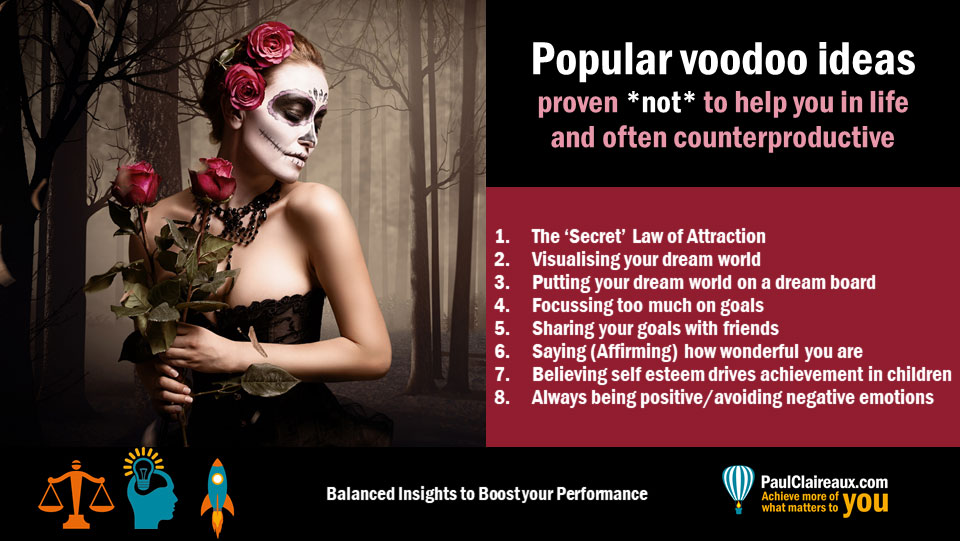
The Psychological studies proving that these ideas don’t work is readily available online but I’m happy to cover them in a future Insight.
Sign up to my newsletter if you want to see that
Success, in any endeavour, does not come from sitting back and saying “don’t worry, be happy.”
Sure, that’s a catchy piece of music but it’s not a strategy for facing into our most serious life challenges. The evidence from the best psychologists is that the happy-clappy crowd are making vulnerable people unhappy.
Now I’m not happy about that and neither is Dr Susan David – the Harvard Medical School Psychologist.
Have a listen to what she has to say.
The key here is not to suppress our so-called negative emotions, but to listen to them. They’re perfectly natural and they actually help us to achieve more.
So, as Susan David says, we need to “face into our thoughts and emotions with curiosity and kindness” … and, as Dr Sarah McKay (neuroscientist and science communicator) says, we need to feel for the sweet spots in our lives between Boredom and Fear.
Here’s my take on that idea:
 In short, the ‘fine’ zone is where we’re bored – whilst the ‘fear’ zone is where we’re overwhelmed with the scale of our task. The magic, unsurprisingly, happens somewhere in the middle.
In short, the ‘fine’ zone is where we’re bored – whilst the ‘fear’ zone is where we’re overwhelmed with the scale of our task. The magic, unsurprisingly, happens somewhere in the middle.
The truth is that if we want to achieve more magical things, we need to learn new skills which means facing into a bit of fear.
We need to get comfortable with being out of our comfort zone. 🙂
Having some fear is good
Our fear is there to protect us from harm.
It stops us in our tracks and ensures that we take more time on more complex and dangerous tasks – whether learning to ski in the mountains or parachute out of an aeroplane… or even learn to fly that aeroplane.
I’ve learned to do all those things over the years and I promise you, they can all be quite frightening at times.
The last thing we need in life is some ‘idiot’ motivational guru telling us that ‘the only thing holding you back is your fear!’ That’s just misleading and dangerous rubbish.
What really holds us back from our bigger goals is often a lack of knowledge or skills about the task in hand. Our fear simply reminds us of this fact.
A bit of fear will not hold you back – but it will look after you.
The people to fear are those who seem as if they have none!
In summary, on the word fine
If we want to achieve more, we need to move off the ‘fine’ (and bored) zone – and expose ourselves to a little bit of productive fear.
If we’ve set ourselves goals, let’s be honest about how we’re feeling about our progress. If the answer is ‘not good’ then say it, at least to yourself. There’s no benefit in denying it.
Feeling ‘shite’ about something is uncomfortable but at least, once we recognise our reality, we’re more likely to look for solid solutions.
Also, if we become completely overwhelmed in one area of our life, we might just need to reduce our expectations in that area for a while.
We know that unhappiness lives in the gap between our expectation and our (perceived) reality and setting unattainable goals is a sure-fire way to reach that state.
We can always raise our expectations again later – after we’ve closed a more modest gap between where we are now and the next stage of our journey. So, this is about taking achievable steps to success – which is an idea I’ll come back to another time.
Of course, if you’re making good progress on a goal, it makes sense to celebrate that progress. For goodness sake, don’t wait for the destination.
The word ‘fine’ is seldom helpful
and by using it we often miss out on
our most valuable emotions in life
at both ends of the spectrum.
The second keyword for success
This second word is a big one when it comes to behavioural change and has been identified by both Drs Steve Peters and David Burns as a word to change because it can seriously block our progress.
So, let’s take a moment to think about this.
If we’ve bought into the idea (from the previous section) that some or other aspect of our life might not be completely ‘fine’ (and assuming that we have an idea of how we might, at least start to, solve that problem) then why would we not simply get on and do that thing?
What word might we use that could possibly stop us from making progress?
Any ideas?
Well, it turns out that the big problem word is ‘should’ … and, like many things in life, the answer is obvious, once you know it.
‘Everything is obvious, once you know the answer’ is a brilliant book, by Duncan Watts and is listed here with some of my other favourites
We all know what happens to the tasks we put on our ‘should do’ list… don’t we?
Yes, those jobs never get done and there’s a good reason why.
We don’t actually want to do them. ‘Should dos’ are ‘unwanted expectations’ according to Psychiatrist David Burns
The word is oppressive and associated with rules that we might have been given by our parents, teachers or bosses…or rules that are ‘dished out’ by fanatical religious leaders or loony, celebrity, motivational gurus – any of whom might make you feel ‘no good’ if you fail to do what you ‘should do’.
‘Should’ is a truly awful word but here’s the interesting thing… despite the fact that we hate being told what to do by others – we tell ourselves what we should do, all day long.
Come on, let’s admit it, we all do that sometimes – and we most certainly talk to ourselves on other matters too, right?
Hmmm, do I talk to myself?
Yes, I guess I do!
So, why do we do this?
Well, as Dr Steve Peters explains in ‘Chimp Paradox’ its because we have two main characters in our heads. The first is our logical human whilst the other is a short-termist, pleasure-seeking Chimp!
There are, of course, lots of other parts to Dr Peters’ model of the brain but you’ll need to read his book for all those 😊
For now, all we need to know is that our Chimp is the more powerful of these two main characters – and it’s a good idea not to provoke your Chimp into a fight.
Hint:
Telling yourself what you should do, without a good reason, will almost certainly upset your chimp which will then go into one of those difficult fight, flight or freeze modes – just as you might expect from an impatient child.
So, we need to learn to sell our chimp on the benefits of our important development tasks.
Chimps, like children, love benefits.
What should we do with our ‘should dos’?
Well, we won’t help ourselves by feeling guilty about not doing things – especially if they’re things that we’ve already decided not to do.
Seriously, how pointless is that?
Yet, that’s exactly what we do when we label a job as a ‘should do’ – whether listed on an APP, a piece of paper, or in our minds.
‘Should dos’ make life painful.
Better to label a task as ‘not doing’ and remove it from the list altogether or label it as a ‘will do’ and set a date for starting it.
However, before you abandon all your important (but not yet started) tasks – or set yourself a load more unattainable goals 😉 – there’s another word you could use instead of ‘should’ and it offers the prospect of much more pleasant life…
How about saying ‘could’ instead of ‘should’?
Could is a gentler (and more persuasive) word to use when thinking about our future plans.
Saying ‘I could’, tells us that we have some autonomy, or ‘Choice’, about our life – and Choice, according to psychologists is one of our big four motivators.
What are the other 3?
Well, there’s:
- Connectedness to others (or Relationships)
- Community (or Purpose) and
- Competence (or Mastery)
Easy to remember either because they all start with the letter ‘C’ or using the RAMP acronym from the first letters of the alternative definitions Relationships, Autonomy, Mastery and Purpose.
Anyway…
Labelling a task as ‘could do’ will likely result in us being less resistant to doing it… and more open-minded to the benefits of that task – which will help us produce better priority lists.
In summary – on the word ‘should’:
Do away with your ‘Should do’ list and
create a ‘could do’ list instead.
It might sound too simple but
it’s more effective and more fun too.
The third magic word for success
This word, I’ll tell you upfront, is ‘Process’… or ‘Approach’ if you prefer less business-like language 🙂 …
Yes, I know, ‘Process’ sounds boring – but it’s really not if we think about the chaos we create in our lives when we don’t have one.
So, let’s explore this a little more.
You’re probably aware that we all have, broadly, two modes of thinking – what Nobel Prize winner Daniel Kahneman described as, thinking fast and slow.
He even wrote a (long) book by the same title.
Your fast thinking mode tells you the answer to the question of what is 2 x 2? – which is easy because you just pull the answer from memory.
Whereas your slower, problem-solving, thinking mode needs more time to answer the question of what is 16 x 23?
If you try working that out in your head you’ll notice it hurts a bit – as your brain switches modes – to do the work!
(The answer is 368 by the way)
What’s clear is that provided you have a process – even if it’s just pushing the buttons on a calculator – you can get to a smart answer reasonably quickly.
So far, so obvious perhaps… but what happens when we face trickier questions, like this one?
What are the chances of this?
What are the chances of any 2 children in a class of 30, having the same birthday?
Any guesses on that one?
Don’t worry if you’re struggling. Everyone will struggle to solve that unless they’re a ‘whizz’ at probability calculations – and even the experts can’t work it out in their heads.
The point here is that for complex problems, most of us don’t know the process – and even those who do, often need time to find the answer.
What is the answer to the riddle?
Well, it will probably surprise you.
It’s 70 %!
In other words, in a group of 30 people, it’s very likely that at least two people have the same birthday.
How amazing is that?
You can find the proof and more riddles, for exploring how our brains mislead us, in my book, ‘Who can you trust about money?’
What do these riddles tell us?
They remind us that our brains prefer to avoid wasting energy on problem-solving where we ‘believe’ there’s a quick and easy answer that we can grab from our memory.
Also, when we don’t know the answer we’ll often rely on other experts if the problem is particularly hard. It’s all about being efficient with our minds.
Though I think some people take this ‘mind switched off’ idea a little too far!
Thank goodness our brains work this way, just think how exhausted we’d be if we had to stop and think (like the first day of driving lessons) about everything we did each day.
Indeed, our brains are so fond of this energy-saving trick that we use it on bigger, more complex questions – about life, love and money too – provided that we have ready-made answers for these things in ‘memory’ – and often we do…
…we call them common sense
So, for example, we say:
• Never look a gift horse in the mouth, or
• Don’t cross your bridges before you reach them, or
• Better safe than sorry, or
• Money can’t buy you love !!!
• Etc…
Now, this is all useful guidance that’s stood the test of time… or so you might think.
There’s just one little problem with common-sense – which is that for every piece of common sense there’s another that offers complete opposite advice!
Take a look at those examples again:
- ‘Never look a gift horse in the mouth’ – is completely at odds with – ‘Beware Greeks bearing gifts’
- ‘Don’t cross your bridges before you reach them’ – argues with – ‘If you fail to plan you plan to fail’
- ‘Better safe than sorry’ – suggests a very different strategy to – ‘Nothing ventured nothing gained’
- And ‘Money can’t buy you love’ is not only at odds with the evidence but also in conflict with the other commons sense saying that: ‘When money goes out the front door, love goes out the back’
There are plenty more examples in the book and the summary on this third point is that:
Using proven processes to solve complex problems avoids the chaos caused by ‘common sense’ answers
The bottom lines
This picture summarises the three points in this Insight.
As to what you do with this, that’s up to you.
Here are a few things you ‘could’ 😉 take forward:
- Question your own (uncommon sense) rules around life, love and money.
- Avoid the ‘made up’ rules of the self-appointed motivational gurus on the stage. Especially the ‘happy clappies’ who promise you the earth if only you’ll learn to think (or dream) hard enough to get the ‘Universe vibrating’ in your favour. That’s just rubbish.
- Be super ‘choosy’ about who you follow for ideas and make sure that their work is grounded in solid science. Avoid all that ‘Voodoo’ Vortex and Vibration nonsense.
- Remember that you’re far more likely to deal with your challenges if you accept them. Denying them, by saying everything’s ‘fine’ or by other means of distraction and escape, will not give you the success you want.
- Be kind to yourself, learn to manage your Chimp and be curious about your thoughts and feelings- they’re probably telling you something, so, don’t blank them out.
- Explore what you ‘could’ do rather than telling yourself what you ‘should’ do. You’ll only fight against ‘instructions.’
- Remember that quick answers will often do more harm than good, especially on your important and complex life challenges where you need your feet on solid ground.
- If you want to master a new skill, it pays to work hard and follow a proven process where there is one. (You can always improve on the process later)
But don’t take my word for all this, ask the Gold medal winners who followed the approach of their fitness coaches and their mind coach, Dr Steve Peters.
If you decide to work with a coach, choose one who’s experienced, trustworthy and competent to guide you through a proven process for solving the particular challenge you’re working on.
Thanks for dropping in
Paul
For more ideas to achieve more in your life and make more of your money, sign up to my newsletter
As a thank you, I’ll send you my ‘5 Steps for planning your Financial Freedom’ and the first chapter of my book, ‘Who misleads you about money?’

Also, for more frequent ideas – and more interaction – you can join my Facebook group here
Share your comments here
You can comment as a guest (just tick that box) or log in with your social media or DISQUS account.


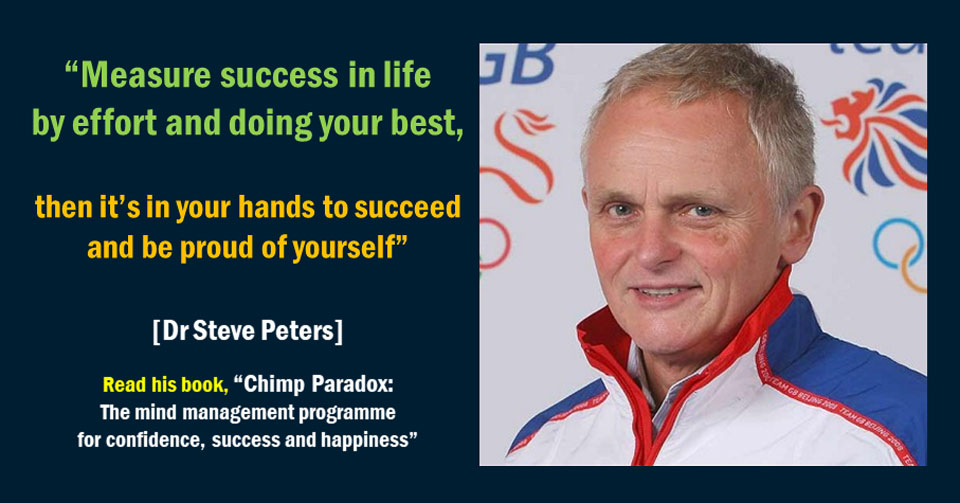
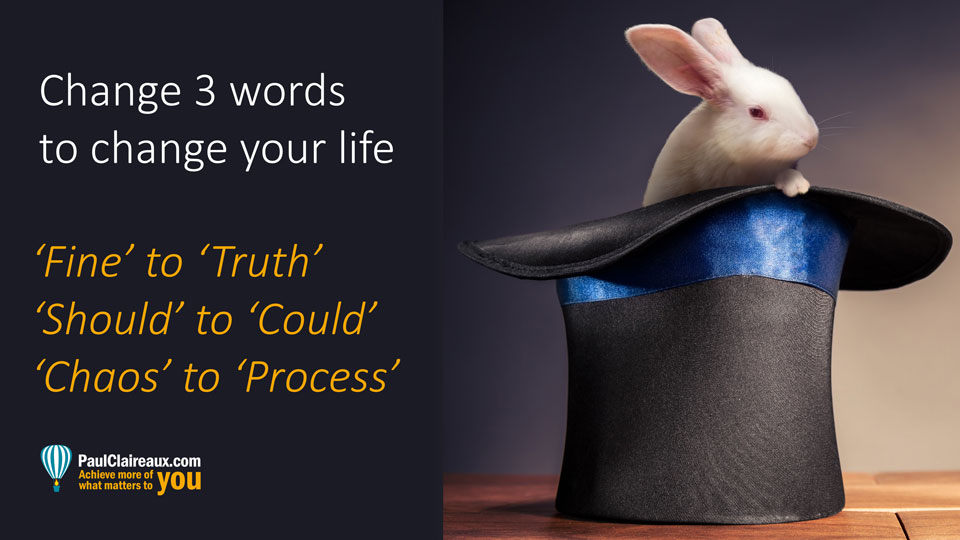
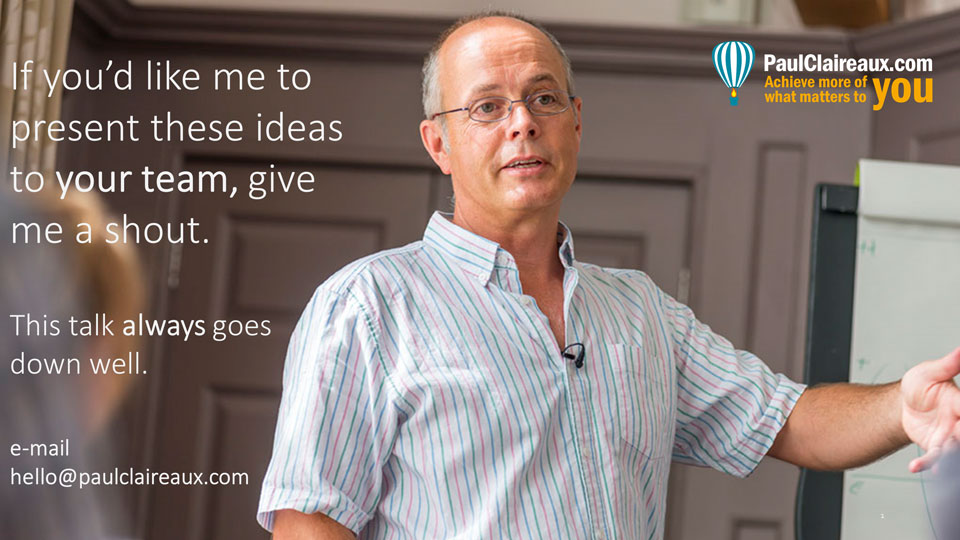
Discuss this article